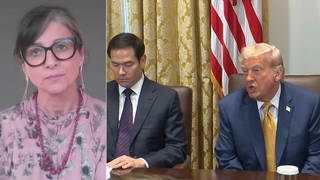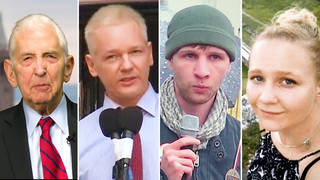
Topics
Guests
- Ralph Naderlongtime consumer advocate, corporate critic and former presidential candidate. He is now organizing with the campaign, TimeForARaise.org. His latest book is Told You So: The Big Book of Weekly Columns, with an introduction by Jim Hightower.
In this web exclusive, we continue our conversation with longtime consumer advocate and former presidential candidate Ralph Nader. He has just published a new book, Told You So: The Big Book of Weekly Columns, and is organizing with the campaign RaiseTheMinimumWage.org.
Watch Part 1 of Today’s Ralph Nader Interview
AMY GOODMAN: This is Democracy Now!, democracynow.org, The War and Peace Report. I’m Amy Goodman, with Aaron Maté. Our guest is Ralph Nader, who’s written a new book called Told You So: The Big Book of Weekly Columns. It’s got an introduction by Jim Hightower. And it is a book of many columns that he has been writing for years. He’s also been running for president for years. Four times, Ralph, you ran for president?
RALPH NADER: Yes.
AMY GOODMAN: Four times. You know, you are so fiercely critical of Obama right now. Would you consider running again?
RALPH NADER: No, but I’ve got a—I’ve got a plan. I’m going to get some enlightened billionaires to turn the 2016 race into a three- or four-way race. And it can be done, because they can write the check for themselves. We have to break up the two-party tyranny. It’s destroying the country, because it’s nothing more than a mission for a few giant corporations to run the country into the ground and to abandon it. Imagine—there’s no gratitude by these corporations. They’ll abandon the jobs and the industry, ship them to fascist and communist regimes overseas who know how to put workers in their place. And there’s no standards for corporate patriotism. You know how these corporations, they always want to be known as people, so they can get all the rights we have? Well, let’s treat them like people and give them standards of patriotism. They were born in this country. They made money in this country. They were bailed out by marines or taxpayers. And we’re not judging them that way. We’re allowing them to depersonalize power and get away with enormous abuses as our country declines, according to many indicators, not just economic.
AARON MATÉ: Ralph, I wanted to present a hypothetical. So, say you back a third party in 2016 and they’re competitive.
RALPH NADER: Mm-hmm.
AARON MATÉ: But what if you have a situation where it’s similar to 2000, where it comes down to a swing state, to Florida? Would you consider backing a call to support the Democratic candidate in a swing state that would decide the election?
RALPH NADER: Well, first of all, I don’t think small parties have that responsibility. They’re not second-class citizens. They have an equal right to run. But let’s say the Democratic Party wanted what you said to happen. Then they could easily adopt the entire platform of the Green Party and say, “OK, we’re going to take it on. Here it is. We’re going to sign an affidavit.” OK? Why do you want to give them something free and let down all your supporters in April, May, June, who worked their heads off to get you to November?
AARON MATÉ: Well, the counterargument is that it’s about more than the volunteers; it’s about the working people of the country.
RALPH NADER: Yeah.
AARON MATÉ: And, as you know, it’s widely understood—
RALPH NADER: Yeah.
AARON MATÉ: —that Republican policies are generally more harmful for working people.
RALPH NADER: Yeah.
AARON MATÉ: So, for their interest, for the sake of not subjecting them to a Republican administration, why not, in this one swing state, say, “OK, let’s go for lesser of two evils”?
RALPH NADER: First of all, you know, you’re talking winner-take-all Electoral College. Let’s get rid of the Electoral College. I mean, Gore won the election by half-a-million votes, and he came in second because he was—Bush was selected by the Supreme Court. So, we want to go there. We don’t want to force to people to say, “We’re going to back off and not give voters more choice, other than Republican and Democrat,” because the system is a winner-take-all Electoral College system and we’ve got to cave and withdraw, because what is—what kind of lesson is that for the next election and the next election? The Democrats can figure out, “Well, they’re always going to back off; we don’t have to change our agenda.” So, that’s what we have to show.
And I—but, by the way, I don’t care about these two parties. And when I was running, my concern—let me give you a few statistical concerns. Hundred thousand people dying in hospitals, medical malpractice; almost nothing was done about it. Fifty-eight thousand workplace-related diseases and deaths every year, OSHA; almost nothing is done about it. Forty-five thousand die because they don’t have health insurance, unlike any other Western country. You have 68,000 people or so dying from air pollution. You have huge numbers of people suffering in poverty. Fifteen million children go to bed hungry at night. That’s what should animate us, not, you know, the difference between increasingly converging Republican and Democratic Party dialing for the same corporate dollars, and then saying to you, the voter, “Hey, you’ve got no choice but one of us. Take the least worst.”
AMY GOODMAN: Let me ask you about Ben Bernanke.
RALPH NADER: Yeah.
AMY GOODMAN: The Federal Reserve is currently on its third round of a program called “quantitative easing.” It’s spending $85 billion a month buying up Treasury and mortgage bonds in a bid to stimulate the economy. So, testifying before the Joint Economic Committee last month, Fed Chair Ben Bernanke said the program will continue until the unemployment rate improves.
BEN BERNANKE: We are looking at—we are trying to make an assessment of whether or not we have seen real and sustainable progress in the labor market outlook. And this is a judgment that the committee will have to make. If we see continued improvement and we have confidence that that is going to be sustained, then we could—in the next few meetings, we could take a step down in our pace of purchases. Again, if we do that, it would not mean that we are automatically aiming towards a complete wind-down. Rather, we would be looking beyond that to seeing how the economy evolves, and we could either raise or lower our pace of purchases, going forward.
AMY GOODMAN: That was Ben Bernanke. Ralph Nader?
RALPH NADER: Yeah, he’s inebriating the speculators on Wall Street. And he’s basically giving more money to speculators who use other people’s money—pension money, mutual fund money—to rake off huge fees and huge profits. So, if he really wants to lower the unemployment rate, if he’s going to have quantitative easing, why isn’t this $85 billion a month being circled through Congress so that they can repair America and create real jobs? See, it’s just printing money. And he is engaging in a huge gamble. And he knows a lot about this. He’s engaging in a huge gamble, that when the bill comes due, we’re going to have rocketing inflation and rocketing interest rates. That’s the real danger, that he’s—for a short-term inflating the stock market. And he makes no bones about it, that this quantitative easing is going to increase stock values, and the Dow Jones is going up and up. But it’s a very dangerous game he’s playing.
AMY GOODMAN: We only have a few minutes. Turkey, people are rising up throughout the country. Talk about what it means, what an uprising like this means to you.
RALPH NADER: Well, first of all, it means that people feel their strength. They lose their fear, as often is said. And we haven’t seen that in the United States. The streets are still available for people. The marches are still available. Occupy Wall Street was a good start, but it fizzled out, for reasons we all know.
AMY GOODMAN: Like what? What are the reasons we all know?
RALPH NADER: One is, the minute they were evicted from the encampments, they lost the media. And they didn’t have an agenda. And I would say to them, repeatedly, “Take up the minimum wage increase. Bring it up to $10.50. You’d be a champion of 30 million workers.” You want to talk about a base? Because, you know, at its peak, Occupy Wall Street, if you add up the number of people who marched around the country, who rallied and who were in the encampments, quarter of a million. That’s all. I mean, look what they did. What if it was two million? What if it was four million? You see?
You know, I’d settle for a tenth of the number of serious bird watchers in this country. I mean, people have to know their strength. They don’t know their strength. They make excuses. They give up on themselves. It’s very sad. Even though they know the Constitution never mentions “corporation,” never mentions the word “company.” It’s all about people. It starts with “We the people.” That’s why I wanted to give the subtitle to this book—I wanted it to be It’s Easier Than You Think, to turn this country around in one area after another, going after corporate crime, living wage, full health insurance, ending these wars of aggression, rebuilding the public works. Good heavens! You know they talk about the 1 percent and the 99 percent, you know, like the 1 percent plutocrats, the 99 percent suffering. How about the other 1 percent? That’s all it takes: Three million Americans in all these congressional districts making—controlling Congress through civic hobby. Some people play mahjong. Some people play poker. Some people watch birds. I want people to watch Congress. You’ll see the change.
AARON MATÉ: Ralph, on the show today we covered the first day of the trial of Bradley Manning. Your thoughts on the Obama administration and its record on whistleblowers?
RALPH NADER: Well, it’s the war criminals prosecuting the innocents. I mean, here’s a man who basically disclosed evidence of war crimes, evidence of lying and cover-up. He’s in the dock. But Cheney and Bush and Wolfowitz and Elliott Abrams and these people, they’re making big-fee speeches and getting published and gaining entry to the corridors of power. So, I agree with Ron Paul. Ron Paul said, “We need more WikiLeaks.” And, by the way, the crimes of secrecy, the crimes of cover-up, have killed thousands of American soldiers and injured and sickened hundreds of thousands. And yet, that isn’t even in a courtroom.
AMY GOODMAN: What do you mean?
RALPH NADER: All the crimes, all the lies about why we had to go into Iraq. It was a lie there’s—there were no weapons of mass destruction. He was not a threat to his neighbors. He was a tottering dictator surrounded by a dilapidated army and with three powerful countries around him if he made a false move. They said he was an ally of al-Qaeda. He was an enemy. He was a secular; al-Qaeda was fundamentalist, etc. All these lies and more got us into this—you know, this huge quagmire in Iraq, of which we’re really not out of yet, blew the country apart. A million Iraqis died. They’re dying now at a thousand a month. We pit one sect against the other. That’s not hard to do if you’re an outside invader with a lot of hundred-dollar bills and death squads, etc. And then we blew apart Afghanistan. Instead of pursuing a criminal gang, we turned this criminal gang into a metastasized gang. Now it’s in a dozen countries. And it’s become—the war on terrorism has become one of the greatest impetuses to our GDP. It’s big business. And that’s why they pay attention to this, because it’s big contracting business—Pentagon contracts and the rest. And that’s why we don’t spend time on saving hundreds of thousands of lives lost that are preventable in this country.
AMY GOODMAN: Ralph, very quickly, on Israel and the Palestinian conflict, you wrote a letter to Secretary of State John Kerry, saying what?
RALPH NADER: I said, if he’s going to succeed with this peace process, he’s got to do more than go to the area four times in three months. He’s got to focus on Congress. Congress is where it’s going to start, unless he turns Congress around. How does he do it? He takes the very prominent Israeli peace advocates, which include former Shin Bet directors, former Mossad directors, former generals, former mayors, former ministers of justice, who are on the outs with Netanyahu—they’re out of power, but they have experience, and they have a constituency—and get them to Capitol Hill. In over 60 years, there’s never been a hearing of prominent Israeli peace advocates. And if he does that, AIPAC would never be able to stop it. Imagine AIPAC saying, “We don’t want former Israeli generals, Israeli mayors and Israeli security experts testifying on Capitol Hill.” So, he has got to go back to his old haunts.
And I wrote a column on this. By the way, anybody can get a copy of the column every week electronically. Just go to nader.org and sign up. But, you see, the pro-peace people don’t have that strategy. It all starts with Congress. When Netanyahu goes to the White House, he’s got Congress in his hip pocket. What is the president of the United States going to do? So—and Kerry knows Congress. So, if he’s serious, he will develop that kind of strategy. You know that movie that you highlighted, The Gatekeepers, the documentary? Well, that was six former Shin Bet retired chiefs.
AMY GOODMAN: The only surviving former Shin Bet leaders.
RALPH NADER: Can you imagine, six of them talking about actions that could have led to peace that were overwritten by politicians? I mean, you’ve got an asset like that, and you bring them to the Senate and the House, what’s AIPAC going to do?












Media Options